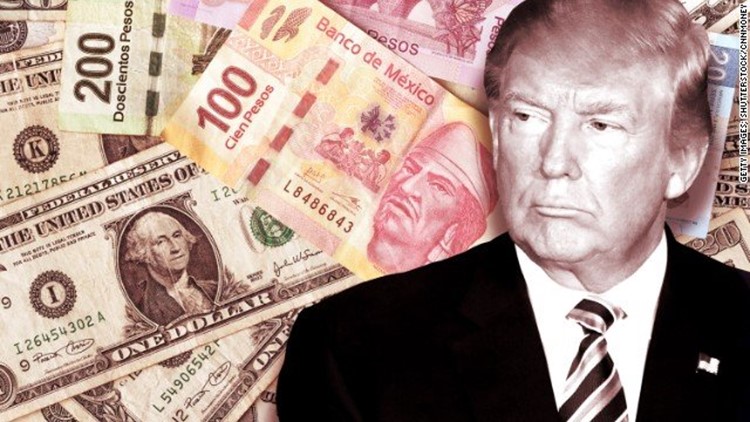HONG KONG – Investors around the world are reacting with shock to Donald Trump‘s victory in the U.S. presidential election.
Global stock markets are dropping, Mexico‘s currency has tanked and U.S. stocks are poised for a very rough open.
Markets hate uncertainty, and many investors believe Trump’s unpredictable nature and anti-trade stance could bring global turmoil.
Dow futures were down about 300 points early Wednesday morning, or about 1.5 percent. At their low point on Tuesday night, Dow futures were down more than 800 points.
Nervous investors may have been soothed after Trump called for Americans to unite after the brutal election campaign.
“Trump definitely sounded more presidential than he has done at any stage during the election campaign,” Kathleen Brooks, a research director at City Index in London, said of his speech. “In fact, one could argue that this outsider has delivered an establishment-style victory speech.”
Most European stock markets are declining, but the losses are not huge. Stock indexes across Asia closed the day in the red. Japan’s Nikkei plummeted 5.4 percent and the Hang Seng in Hong Kong fell by 2.2 percent.
Stock futures began tumbling after 9 p.m. as it became clear that Hillary Clinton‘s chances of winning crucial states such as Florida, North Carolina and Ohio were in serious doubt. She would later lose all three to Trump.
“It is looking like another Brexit-type surprise,” said Ryan Detrick, senior market strategist at LPL Financial.
By comparison, the Dow fell 610 points, or 3.4 percent on June 24 after Britain’s shocking vote to leave the European Union.
The U.K.’s FTSE 100 dropped 3.2 percent the day after the vote. The British pound had one of its biggest one-day declines on record, falling 9 percent to $1.33, then the lowest it had been since 1985.
Markets have rebounded since then, partially because the weak pound helped support the economy.
The U.S. dollar hasn’t been hit as hard as the pound was – it dropped sharply but then recovered most of its losses Wednesday morning.
While Wall Street is on track for post-election losses, they are not nearly as bad on a percentage basis as those experienced during the 2008 financial crisis when several plunges of greater than 6 percent occurred.
Wall Street appears to have been caught leaning in the wrong direction before the vote. The Dow raced nearly 400 points on Monday as investors bet that Clinton’s chances of winning improved after the FBI cleared her in the email investigation.
Investors are turning to assets that are seen as safer bets in times of uncertainty. For example, gold is surging 2 percent and the Japanese yen is climbing against all other major currencies.
Crude oil prices were down nearly 4 percent, but have since recovered nearly all their losses.
The country’s finance ministry and central bank were holding an emergency meeting Wednesday afternoon after wild trading in Japan’s stock market and currency.
The Japanese yen, a currency that’s seen as a safe haven in times of uncertainty, surged more than 2 percent against the dollar.
A strengthening yen is bad news for many Japanese companies and the economy. It hurts exporters by making goods produced in Japan more expensive overseas. And as imports get cheaper, it makes it much harder for Japan to tackle deflation, which has plagued the world’s third biggest economy for decades.
The yen is still below the highs against the dollar it reached in the aftermath of Britain’s vote in June to leave the European Union. But the emergency meeting suggests Japanese officials are worried it could climb further.
Japan wasn’t the only country hit by the election fallout. Other Asian markets dropped, and U.S. stock futures plunged.
The country’s currency crashed 8 percent to an all-time low Wednesday morning, as the U.S. election race tightened and the prospect of a Donald Trump presidency rose. Earlier the peso was down as much as 11 percent to an all-time low.
Mexico’s central bank said that it will hold a joint press conference with its finance ministry at 8 a.m.
U.S. stock futures also tanked as did other stock markets in Japan and China. Trump’s anti-trade talk and his unpredictability has led to a great deal of apprehensiveness in the global markets.
The U.S. is Mexico’s largest trade partner andTrump has attacked Mexico from Day 1 of his campaign. No wonder, the peso is falling so hard.
“The Mexican peso has been hit hardest, it’s been the biggest casualty,” says Neil Shearing, chief emerging market economist at Capital Economics, a research firm.
One dollar equaled 20.33 pesos by late Tuesday evening. It has never traded at that level before.
Trump has proposed slapping tariffs on goods made in Mexico, ending the free trade agreement NAFTA, taxing cash remittances from America to Mexico, and building a wall along the border, which he says Mexico would pay for.
A Trump presidency would not bode well for Mexico, which heavily depends on trade with the United States. About 30 percent of Mexico’s economy consists of its exports, and almost all of those exports come across the border. The Mexican economy is already dealing with a litany of headwinds, such as low oil prices and government spending cuts.
Shearing forecasts that the value of the currency could fall further — to as low as 25 pesos to the dollar — by Wednesday morning, forcing Mexico’s central bank to call an emergency meeting, and hike interest rates 1-1 percent.
Other economist agree – Mexican officials will have to react soon if Trump does prevail.
“They will react immediately. They won’t be sitting on the sidelines for two or three days,” says Alberto Ramos, head of Latin America economic research at Goldman Sachs.
Mexico’s central bank governor, Agustin Carstens, told Milenio TV in Mexico last week that he and the finance ministry had put together a “contingency plan” if Trump were to win, but declined to give details.



